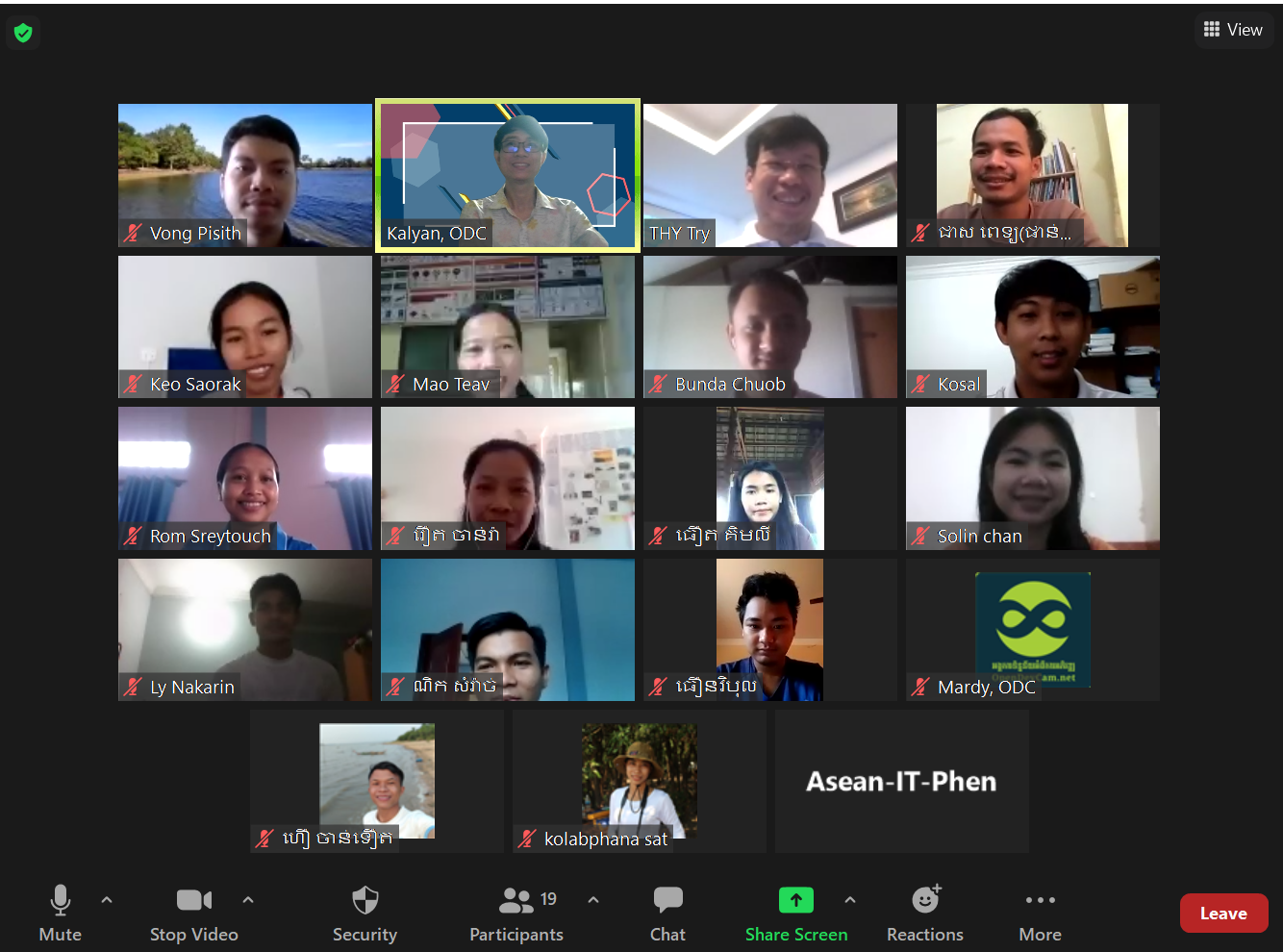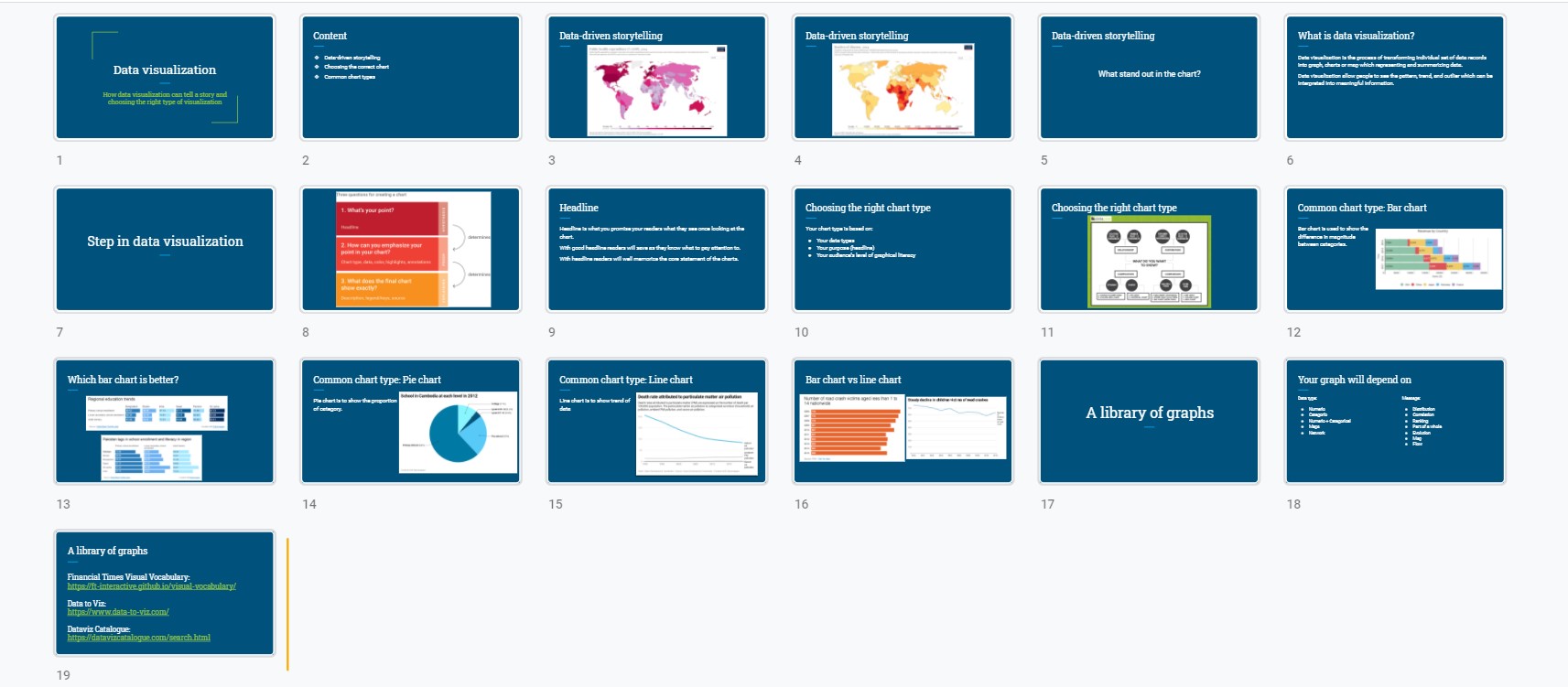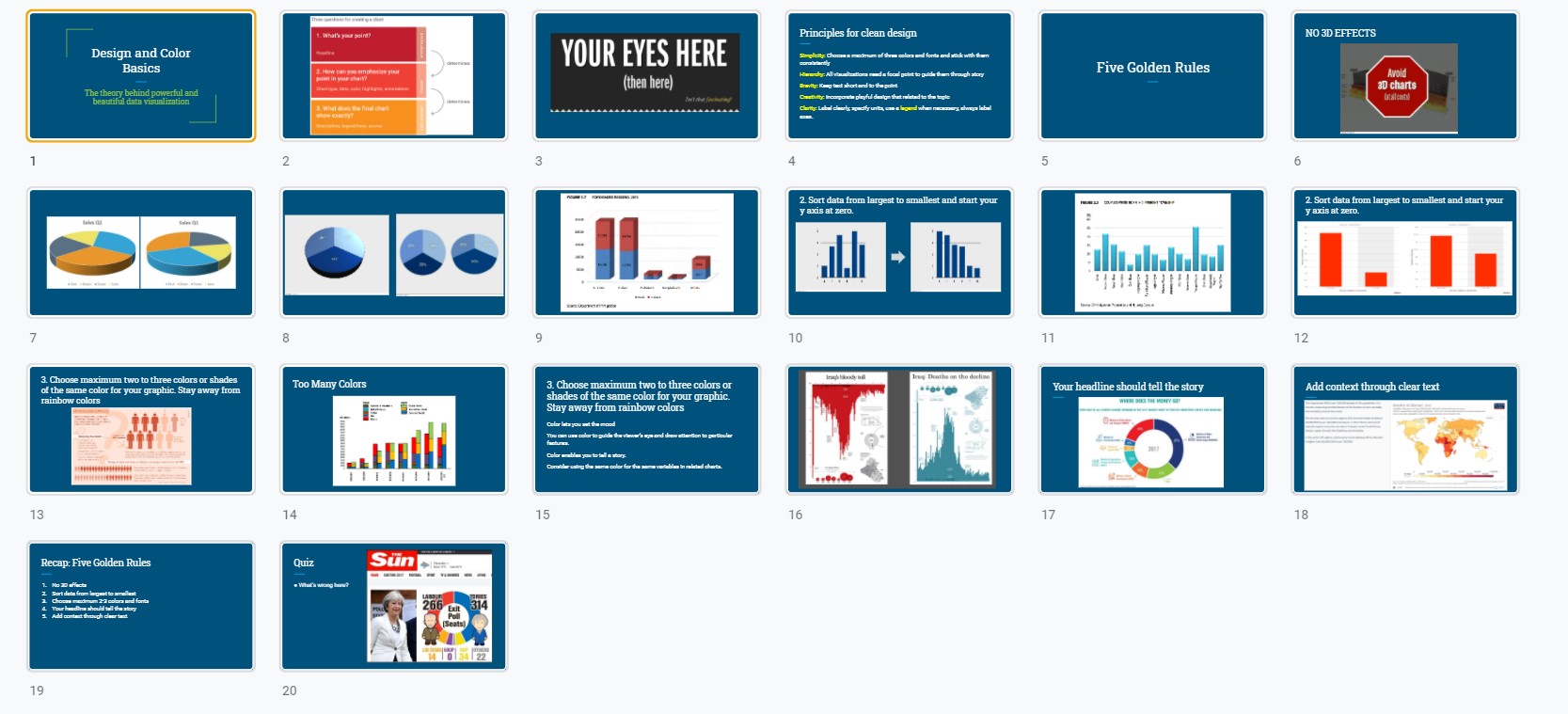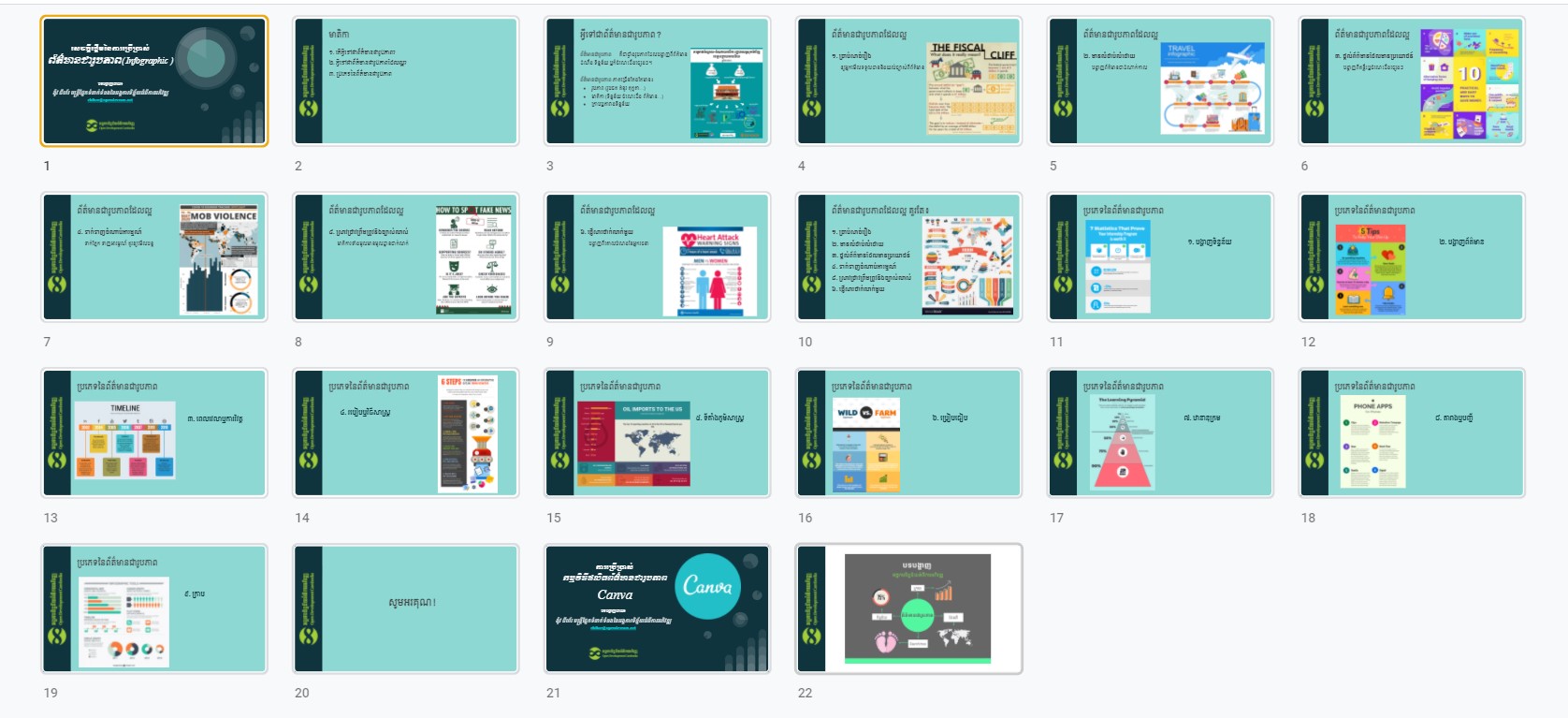វគ្គបណ្តុះបណ្តាលស្តីអំពីអក្ខរកម្មទិន្នន័យទៅលើប្រធានបទសុខភាពសាធារណៈលើកទី២
នៅថ្ងៃទី៥ ទី៦ ទី៨ និងទី៩ ខែមេសា ឆ្នាំ២០២១ អង្គការទិន្នន័យអំពីការអភិវឌ្ឍ (អូឌីស៊ី) បានធ្វើសិក្ខាសាលាបណ្តុះបណ្តាលស្តីអំពី «អក្ខរកម្មទិន្នន័យទៅលើប្រធានបទសុខភាពសាធារណៈ» ប្រកបដោយជោគជ័យ។ នេះគឺជាការបណ្តុះបណ្តាលលើកទី២ នៅក្រោមប្រធានបទនេះ។ ដើម្បីទប់ស្កាត់ការរីករាលដាលនៃវីរុសកូវីដ-១៩ នៅក្នុងសហគមន៍តាមវិធានការរបស់រដ្ឋាភិបាល វគ្គបណ្តុះបណ្តាលនេះត្រូវបានរៀបចំឡើងដោយក្រុមការងារ អូឌីស៊ី ធ្វើឡើងតាមរយៈកម្មវិធី Zoom ដែលជាវេទិកាសម្រាប់ធ្វើសន្និសិទវីដេអូ។ វគ្គបណ្តុះបណ្តាលនេះត្រូវបានររៀបចំឡើងដោយមានការចូលរួមពីសិក្ខាកាមចំនួន ១៥នាក់ (៨នាក់ជាស្ត្រី) ដែលជាយុវជនមកពីបណ្តាញ អ្នកសារព័ត៌មានពលរដ្ឋ មកពីខេត្តសៀមរាប កំពង់ធំ ព្រះវិហារ និងកំពង់ឆ្នាំង។
គោលបំណងសំខាន់នៃសិក្ខាសាលាបណ្តុះបណ្តាលអក្ខរកម្មទិន្នន័យទៅលើប្រធានបទសុខភាពសាធារណៈនេះត្រូវបានរៀបចំឡើងដើម្បីបង្កើនសមត្ថភាពរបស់សិក្ខាកាមលើចំណេះដឹងអំពីទិន្នន័យនៅក្នុងប្រទេសកម្ពុជា ដោយផ្តោតអារម្មណ៍ទៅលើទិន្នន័យ ដើម្បីឱ្យពួកគេមានសមត្ថភាព ប្រើប្រាស់ និងធ្វើទស្សនីយកម្មទិន្នន័យយ៉ាងស្ទាត់ជំនាញនៅក្នុងការងារប្រចាំថ្ងៃរបស់ពួកគេ។ លើសពីនេះទៅទៀត វគ្គបណ្តុះបណ្តាលនេះក៏មានគោលបំណងឱ្យអ្នកចូលរួមមានសមត្ថភាពដាក់បញ្ចូលទិន្នន័យទៅក្នុងការសរសេរពីព្រឹត្តិការណ៍ ឬរឿងរ៉ាវផ្សេងៗដែលអាចឈានដល់ការផ្សព្វផ្សាយទៅសាធារណៈកាន់តែទូលំទូលាយ។
វគ្គបណ្តុះបណ្តាលនេះត្រូវបានចាប់ផ្តើមដោយមានសន្ទរកថាស្វាគមន៍ពី លោក ធី ទ្រី ដែលជានាយកប្រតិបត្តិនៃអង្គការអូឌីស៊ី។ នៅក្នុងការថ្លែងសន្ទរកថាដ៏មានតម្លៃនេះ លោក ធី ទ្រី បានលោកឡើងអំពីសារៈសំខាន់នៃទិន្នន័យ អត្ថប្រយោជន៍ និងសក្តានុពលរបស់វា ហើយអំពាវនាវដល់អ្នកចូលរួមទាំងអស់ទទួលបាននូវចំណេះដឹងឱ្យបានច្រើនតាមដែលអាចធ្វើទៅបាននៅអំឡុងពេលបណ្តុះបណ្តាលនេះ។ បន្ទាប់មកទៀត វគ្គណែនាំត្រូវបានបន្តធ្វើឡើងដើម្បីឱ្យអ្នកចូលរួមទាំងអស់បានស្គាល់គ្នា អាចរៀនធ្វើការជាមួយគ្នា និងបង្ហាញពីការរំពឹងទុករបស់ពួកគេម្នាក់ៗអំពីវគ្គ បណ្តុះបណ្តាលនេះ។ លោក ធី ទ្រី ក៏បានបង្ហាញអំពីតួនាទីដ៏សំខាន់នៃទិន្នន័យនៅក្នុងវិស័យសុខភាពសាធារណៈនិងរបៀបដែលអាចប្រើប្រាស់ទិន្នន័យក្នុងការផ្សព្វផ្សាយព័ត៌មាន។ ក្នុងន័យនេះលោកបានគូសបញ្ជាក់បន្ថែមទៀតអំពីសក្តានុពលនិងផលប៉ះពាល់នៃការប្រើប្រាស់ទិន្នន័យក្នុងវិស័យសុខភាពសាធារណៈជាពិសេសក្នុងកំឡុងពេលរាតត្បាតនៃវីរុសកូវីដ-១៩ នៅប្រទេសកម្ពុជា។
វគ្គទី១នៃការបណ្តុះបណ្តាលត្រូវបានផ្តល់ជូនដោយ លោក ហៀង កុសល ដែលជាអ្នកស្រាវជ្រាវខាងសេដ្ឋកិច្ចនៃអង្គការអូឌីស៊ីបានចូលធ្វើបទបង្ហាញ។ នៅក្នុងវគ្គចាប់ផ្តើមនេះ លោក ហៀង កុសល បានបង្ហាញពីនិយមន័យទូទៅនៃទិន្នន័យ គំនិតមូលដ្ឋាននៃប្រភេទទិន្នន័យ ជាពិសេសទិន្នន័យបែបគុណភាព និងបរិមាណ និយមន័យនៃទិន្នន័យបើកទូលាយ និងសារៈសំខាន់របស់វា និងវដ្តតម្លាភាពដែលត្រូវបានបង្កើតឡើងដោយផ្អែកលើទិន្នន័យបើកទូលលាយ។ បន្ទាប់ពីបញ្ចប់វគ្គទី១ លោកបានបន្តធ្វើបទបង្ហាញអំពីការបង្កើតទស្សនីយកម្មទិន្នន័យនៅក្នុងសារព័ត៌មានដោយផ្តោតលើនិយមន័យមូលដ្ឋានប្រភេទទិន្នន័យនៅក្នុងសារព័ត៌មាន និងស្វែងយល់ពីសារៈសំខាន់នៃទស្សនីយកម្មទិន្នន័យនៅក្នុងសារព័ត៌មាន។ គោលបំណងគឺដើម្បីបណ្តុះបណ្តាលសមត្ថភាពរបស់អ្នកចូលរួមក្នុងការទទួលស្គាល់ការប្រើប្រាស់ទិន្នន័យនៅក្នុងជីវិតប្រចាំថ្ងៃរបស់ពួកគេ។
លោក វង្ស ពិសិទ្ធ ជាមន្ត្រីជាន់ខ្ពស់ផ្នែកស្រាវជ្រាវទិន្នន័យ និងប្រព័ន្ធព័ត៌មានភូមិសាស្ត្រ (GIS) របស់អង្គការអូឌីស៊ី ទទួលបន្ទុកវគ្គបន្ទាប់ដែលគាត់បានបង្ហាញគោលការណ៍ទូទៅនៃការធ្វើទស្សនីយកម្មទិន្នន័យ។ គាត់បានសង្កត់ធ្ងន់លើផ្នែកបច្ចេកទេសបន្ថែមទៀតនៃវិធីសាស្ត្រនៃការធ្វើទស្សនីយកម្មទិន្នន័យអាចប្រាប់រឿងរ៉ាវដល់អ្នកអាន និងវិធីជ្រើសរើសប្រភេទក្រាប ក្រាហ្វិកត្រឹមត្រូវដើម្បីពន្យល់អំពីទិន្នន័យ។ បន្ទាប់ពីឱកាសនៃការចែករំលែកនេះ អ្នកអានអាចស្វែងយល់អំពីឯកសណ្ឋានភាពនៃការធ្វើទស្សនីយកម្មទិន្នន័យដែលទាក់ទងនឹងប្រធានបទឱ្យបានត្រឹមត្រូវ។
នៅថ្ងៃទី២ ត្រូវបានចាប់ផ្តើមពីការណែនាំបន្ថែមទៀតអំពីទស្សនីយកម្មទិន្នន័យ ដោយលោក វង្ស ពិសិទ្ធ។ ក្នុងវគ្គនេះត្រូវបានផ្តោតសំខាន់ទៅលើការជ្រើសរើស ក្រាហ្វិកដែលត្រឹមត្រូវសម្រាប់រៀបរាប់រឿងរ៉ាវរបស់ទិន្នន័យទៅកាន់អ្នកអាន។ គាត់បានបង្ហាញអំពីជំហាន នីមួយៗក្នុងការបង្កើតទស្សនីយកម្មទិន្នន័យដោយប្រើប្រាស់កម្មវិធី Datawrapper ដែលជាឧបករណ៍ Online សម្រាប់ធ្វើទស្សនីយកម្មទិន្នន័យ។ ក្រៅពីការសិក្សាអំពីការប្រើប្រាស់ឧបករណ៍នេះ លោកក៏បានផ្តល់ លំហាត់អនុវត្តន៍សម្រាប់សិក្ខាកាមដែលបានចូលរួមក្នុងការធ្វើការងារនេះដោយផ្ទាល់ជាមួយនូវអី្វដែលពួកគាត់បានសិក្សា។ លំហាត់អនុវត្តន៍នេះផ្តោតសំខាន់លើការរីករាលដាលនៃវីរុសកូវីដ-១៩ នៅក្នុងប្រទេសកម្ពុជា។
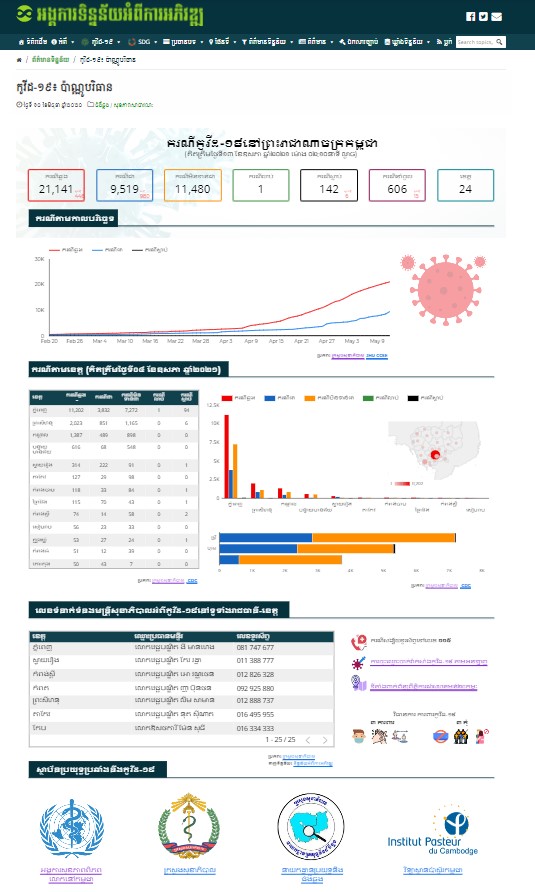 នៅថ្ងៃទី ៣ នៃសិក្ខាសាលាបណ្តុះបណ្តាលនេះ លោក ង៉ូវ ជីហ័រ ជាមន្ត្រីផ្នែកទំនាក់ទំនងនៃអង្គការអូឌីស៊ីបានចាប់ផ្តើមដោយបង្ហាញមេរៀនស្តីពីការបង្ហាញរូបភាព ដែលជាជម្រើសក្នុងការធ្វើទស្សនីយកម្មទិន្នន័យ។ ក្នុងន័យនេះវគ្គបណ្តុះបណ្តាលបានចាប់ផ្តើមដោយការណែនាំដល់អ្នកចូលរួមនូវនិយមន័យជាមូលដ្ឋាននៃ ព័ត៌មានជារូបភាព (Infographic) និងចំណុចដើម្បីឈានដល់ឯកសណ្ឋានភាពនៃព័ត៌មានជារូបភាព (Infographic)។ គាត់បានណែនាំនូវឧបករណ៍ Online ឈ្មោះថា Canva និងផ្តល់ប្រឹក្សាទៅលើការបង្កើតព័ត៌មានជារូបភាព ឱ្យមានភាពច្បាស់លាស់ និងប្រកបទៅដល់ការប្រាប់នូវរឿងរ៉ាវទិន្នន័យ។ បន្ទាប់ពីការសិក្សាអំពីវិធីសាស្ត្រប្រើប្រាស់ឧបករណ៍ គាត់បានអនុញ្ញាតឱ្យអ្នកចូលរួមដើម្បីស្វែងយល់អំពីឧបករណ៍ និងបង្កើតព័ត៌មានជារូបភាពដោយផ្ទាល់។ ថ្ងៃទីបីត្រូវបានបញ្ចប់នៅពេលដែលអ្នកចូលរួមម្នាក់ៗបានផលិតព័ត៌មានជារូបភាពផ្ទាល់ខ្លួនរបស់ពួកគេ។
នៅថ្ងៃទី ៣ នៃសិក្ខាសាលាបណ្តុះបណ្តាលនេះ លោក ង៉ូវ ជីហ័រ ជាមន្ត្រីផ្នែកទំនាក់ទំនងនៃអង្គការអូឌីស៊ីបានចាប់ផ្តើមដោយបង្ហាញមេរៀនស្តីពីការបង្ហាញរូបភាព ដែលជាជម្រើសក្នុងការធ្វើទស្សនីយកម្មទិន្នន័យ។ ក្នុងន័យនេះវគ្គបណ្តុះបណ្តាលបានចាប់ផ្តើមដោយការណែនាំដល់អ្នកចូលរួមនូវនិយមន័យជាមូលដ្ឋាននៃ ព័ត៌មានជារូបភាព (Infographic) និងចំណុចដើម្បីឈានដល់ឯកសណ្ឋានភាពនៃព័ត៌មានជារូបភាព (Infographic)។ គាត់បានណែនាំនូវឧបករណ៍ Online ឈ្មោះថា Canva និងផ្តល់ប្រឹក្សាទៅលើការបង្កើតព័ត៌មានជារូបភាព ឱ្យមានភាពច្បាស់លាស់ និងប្រកបទៅដល់ការប្រាប់នូវរឿងរ៉ាវទិន្នន័យ។ បន្ទាប់ពីការសិក្សាអំពីវិធីសាស្ត្រប្រើប្រាស់ឧបករណ៍ គាត់បានអនុញ្ញាតឱ្យអ្នកចូលរួមដើម្បីស្វែងយល់អំពីឧបករណ៍ និងបង្កើតព័ត៌មានជារូបភាពដោយផ្ទាល់។ ថ្ងៃទីបីត្រូវបានបញ្ចប់នៅពេលដែលអ្នកចូលរួមម្នាក់ៗបានផលិតព័ត៌មានជារូបភាពផ្ទាល់ខ្លួនរបស់ពួកគេ។
នៅថ្ងៃចុងក្រោយ ការបណ្តុះបណ្តាលត្រូវបានផ្តោតទៅលើការធ្វើការងារជាក្រុម។ គោលបំណងនៃវគ្គនេះគឺដើម្បីធ្វើឱ្យប្រាកដថាអ្នកចូលរួមអាចអនុវត្តអ្វីដែលពួកគេបានរៀន ទៅជាការអនុវត្តជាក់ស្តែង។ ការអនុវត្តជាក់ស្តែងនឹងអនុញ្ញាតឱ្យពួកគេបង្កើនចំណេះដឹងបន្ថែមទៀតនៃការធ្វើទស្សនីយកម្មទិន្នន័យ។ ក្រុមការងារអូឌីស៊ីបានណែនាំឱ្យអ្នកចូលរួមទាំងអស់ធ្វើការរួមគ្នានៅក្នុងក្រុម។ នៅក្នុងសកម្មភាពក្រុម ក្រុមការងារអូឌីស៊ីបានស្នើសុំឱ្យពួកគេធ្វើការលើទិន្នន័យសុខភាពសាធារណៈជាពិសេសលើទិន្នន័យកូវីដ-១៩ នៅក្នុងប្រទេសកម្ពុជា។ ពួកគេបានបង្កើតធនធានទាំងនោះទៅជាទម្រង់ផ្សេងៗគ្នានៃរឿងរ៉ាវទិន្នន័យដែលមានជាក្រាប និងព័ត៌មានជារូបភាព (Infographic)។ លើសពីនេះទៅទៀត ក្រុមទាំងអស់ត្រូវបានស្នើសុំឱ្យបង្ហាញការងាររបស់ពួកគេនៅលើក្រុមហ្វេសប៊ុករបស់ក្រុមការងារអូឌីស៊ីដើម្បីទទួលបាននូវមតិស្ថាបនាប្រកបដោយភាពច្នៃប្រឌិតពីសំណាក់គ្រូបង្វឹក និងសិក្ខាកាមផ្សេងទៀត។
ផ្អែកទៅលើការវាយតម្លៃមុនពេលបណ្តុះបណ្តាល និងក្រោយបណ្តុះបណ្តាល អ្នកចូលរួមបានបង្ហាញពីការអភិវឌ្ឍបន្ថែមទៀតទៅលើការយល់ដឹងអំពីទិន្នន័យ ជំនាញក្នុងការធ្វើទស្សនីយកម្មទិន្នន័យ ការរៀបរាប់ពីរឿងរ៉ាវទិន្នន័យ និង ចំណេះដឹងមូលដ្ឋានគ្រឹះនៃការប្រើប្រាស់ឧបករណ៍ទស្សនីយកម្មទិន្នន័យ។ ពិន្ទុរបស់ពួកគេបានកើនឡើងគួរឱ្យកត់សម្គាល់ មុន និងបន្ទាប់ពីទទួលបានការបណ្តុះបណ្តាល។ ផ្អែកលើស្នាដៃ និងការយល់ដឹងអំឡុងពេលបណ្តុះបណ្តាល របស់អ្នកចូលរួមយល់ឃើញថា ប្រសិទ្ធិភាពនៃការរៀបរាប់រឿងរ៉ាវទិន្នន័យ ហើយនឹងចំណេះដឹងទៅលើការប្រើប្រាស់ទិន្នន័យ សម្រាប់ការរៀបចំ និងបង្កើតឡើងជាទស្សនីយកម្មទិន្នន័យរបស់ពួកគាត់កាន់តែមានភាពប្រសើរឡើងថែមទៀត។ អ្នកចូលរួមម្នាក់បានកោតសរសើរចំពោះវគ្គបណ្តុះបណ្តាលនេះថា វាពិតជាបានផ្តល់នូវសារៈប្រយោជន៍យ៉ាងខ្លាំងចំពោះអ្នកសារព័ត៌មានពលរដ្ឋវ័យក្មេងដូចជាគាត់ក្នុងការសិក្សាអំពីទស្សនីយកម្មទិន្នន័យ និង ព័ត៌មានជារូបភាព។ បន្ទាប់ពីទទួលបានការបណ្តុះបណ្តាលគាត់អាចធ្វើការបង្កើតទស្សនីយកម្មទិន្នន័យបានដោយខ្លួនគាត់ផ្ទាល់ ដោយពុំទាមទារការជួយបន្ថែមពីអ្នកដទៃ។
អត្ថបទសរសេរដោយ៖ លោក ថាន ដាវីត អ្នកហាត់ការផ្នែកស្រាវជ្រាវនៅអូឌីស៊ី។
អានប្លក់៖ វគ្គបណ្តុះបណ្តាលស្តីអំពីអក្ខរកម្មទិន្នន័យទៅលើប្រធានបទសុខភាពសាធារណៈលើកទី១
